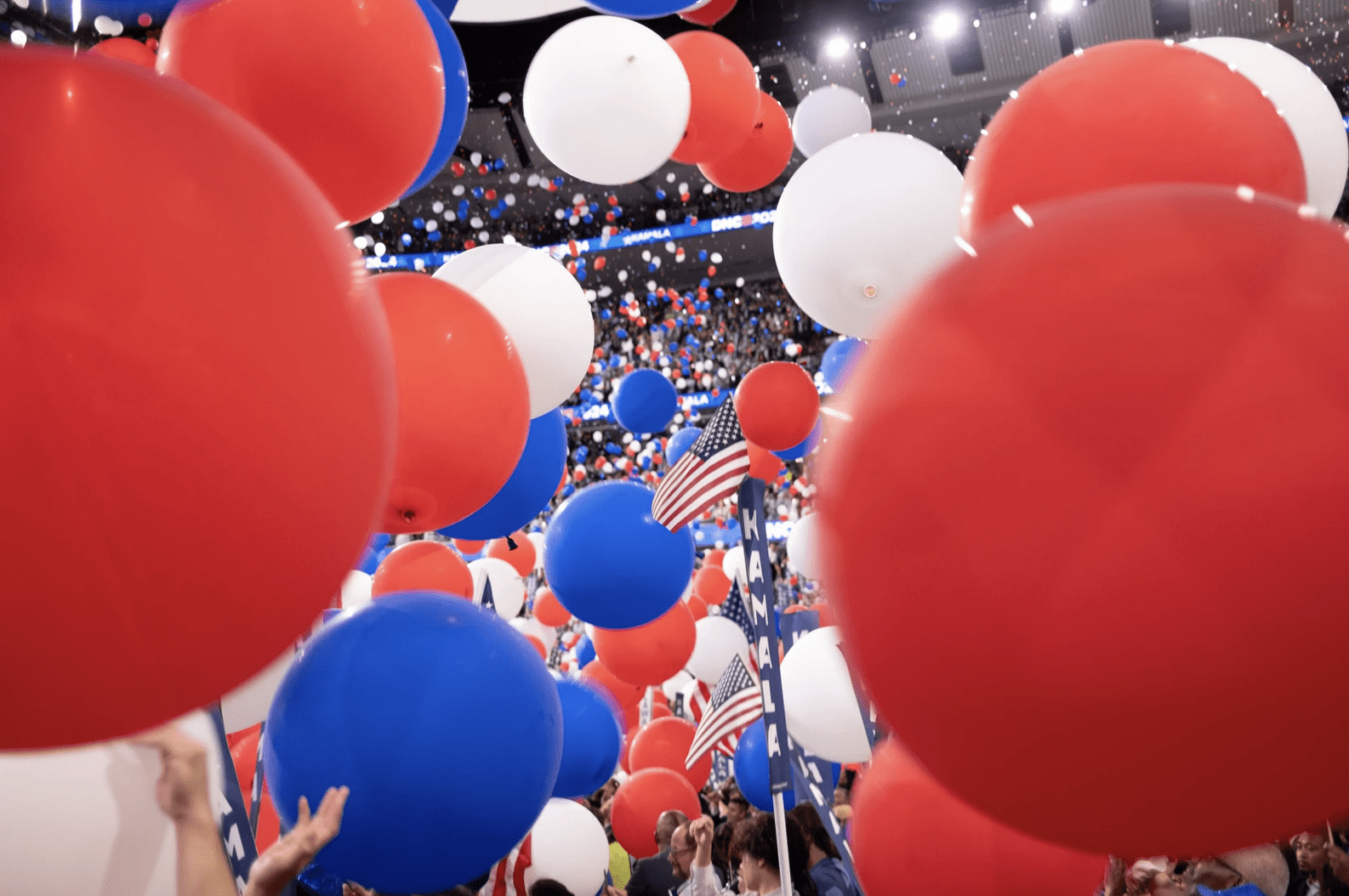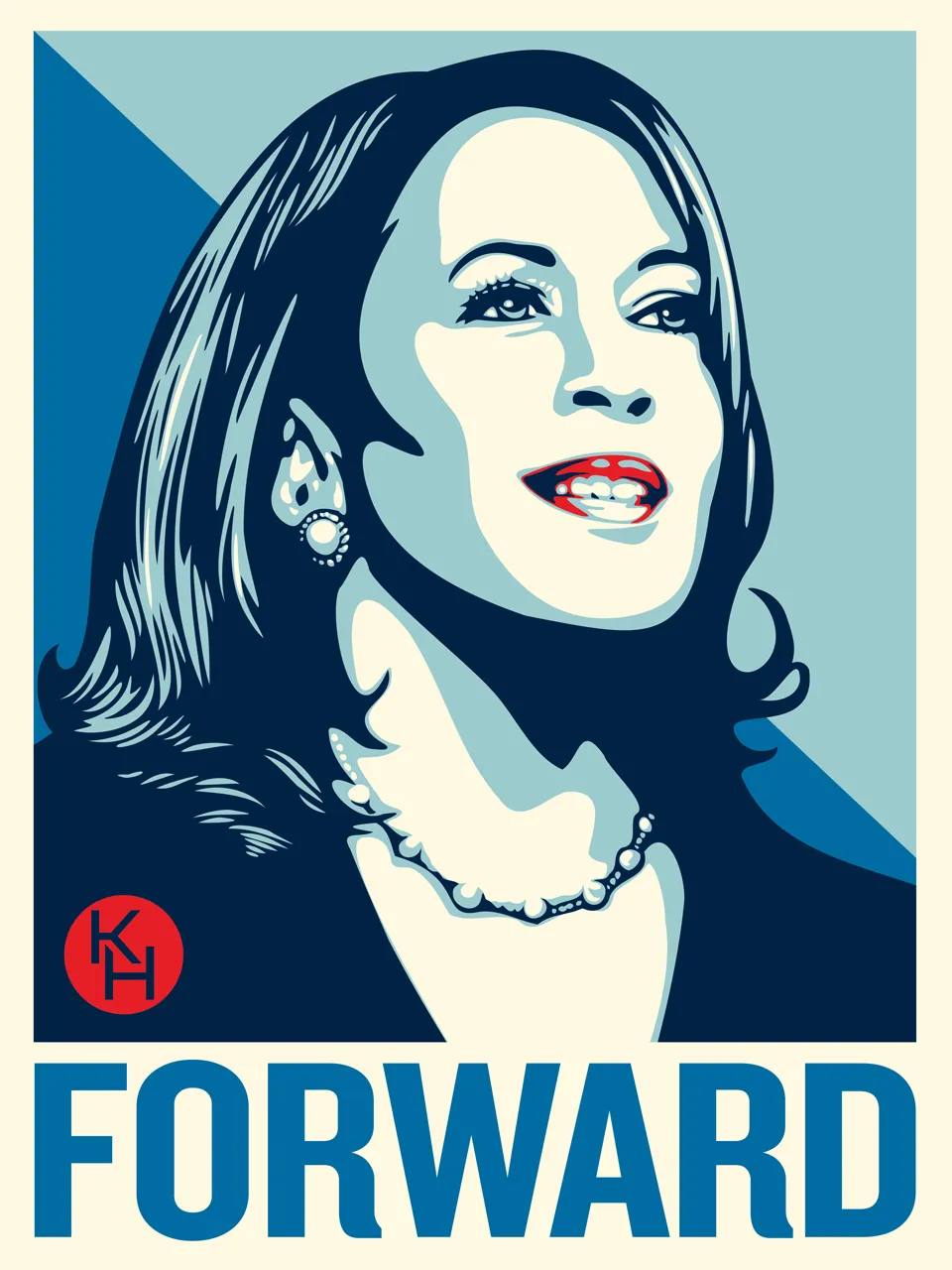Drunk on Joy in a Ted Lasso Chicago
 The epic DNC balloon drop/Chicago Sun-Times
The epic DNC balloon drop/Chicago Sun-Times
By Martine St-Victor
August 28, 2024
This article was first published in French in La Presse.
Ted Lasso is the main character of the AppleTV+ series of the same name. An American, Lasso coaches a soccer team in England. I’ll come back to that.
On the eve of the Democratic National Convention that ended last Thursday, several comparisons were made with the one in 1968 — also in Chicago and the scene of massive demonstrations. Two months before that convention, Robert F. Kennedy Sr., then the great hope of the Democratic Party and presidential candidate, was killed by an assassin’s bullets.
I’ve just returned from the convention. During the four days of what was a bit like a music festival in which elected officials had replaced the majority of artists, the Kennedy name was once again on the lips of many. Former President John F. Kennedy’s grandson, Jack Schlossberg, addressed the crowd at the United Center and in front of more than 20 million TV viewers, flanked by the grandson of former President Jimmy Carter.
The Harris-Walz ticket is surfing on decency. Its success is tangible, with at least $540 million raised since Kamala Harris entered the race barely a month ago.
Schlossberg is the son of Caroline Kennedy, cousin of Robert Kennedy Jr., the former independent presidential candidate who recently endorsed Donald Trump. But more importantly, he is the nephew of the late John F. Kennedy Jr. It is he, who lost his life in a 1999 plane crash, who has been on my mind a lot since Kamala Harris and her running mate Tim Waltz injected a healthy dose of vitamin B12 into the current campaign.
JFK Jr. grew up under a magnifying glass, and many saw him as a future president of the United States after his speech at the 1988 Democratic National Convention. He chose law instead and later became editor-in-chief of George magazine, which he had co-founded in 1995. One day, in an interview, he would say, “People often tell me I could be a great man. I’d rather be a good man.”
The Harris-Walz ticket is surfing on decency. Its success is tangible, with at least $540 million raised since Kamala Harris entered the race barely a month ago, with a million new donors. And to add to these new donors, there are hundreds of thousands of new registered voters for next November 5th. These donors and voters did not feel engaged or invested in the campaign before Harris, and then Walz, entered the race. People who were seduced by the Democratic electoral program, yes, but also by the messages of joy and hope of the dynamic tandem.

This election, beyond politics, is a choice between propriety and indecency. Between building and deconstructing. This election is also almost like slam competition to see who can best tell “The American Story”. The one of today and the one of tomorrow. It is therefore not surprising that the campaign inspired the artist Shepard Fairey to create a poster of Kamala Harris with the word “Forward” as the star, just as he had made the word “Hope” the star of Barack Obama’s iconic “Hope” poster.
In August 2020, as most of us were cooped up at home amid a pandemic, AppleTV+ released the first season of Ted Lasso, which shot to the top of the streaming giant’s charts. With his enthusiasm, joviality, and messages of hope, Coach Lasso, played by Saturday Night Live alum Jason Sudeikis, offered us an escape and deliverance from a world that then seemed incomprehensible and frightening.
As a Montrealer, a Quebecer and a Canadian, I envy this sudden political enthusiasm and excitement for civic engagement.
Earlier this year, author and New York Times columnist Frank Bruni published the book The Age of Grievance. In his book, Bruni argues that both the right and the left are to blame for this climate of rage in which everyone feels wronged. All this anger and grievance in politics, which can generate anxiety, is heavy and exhausting. Yet part of the role of our elected officials is to lighten our burden, to make us feel part of a collective, to reassure us and to be optimistic. Lucidity and optimism can coexist with the sometimes-terrible realities of our times; they are not mutually exclusive. It is an equation that the writers of Ted Lasso, Kamala Harris, and Tim Walz understood well.
In the eulogy for his brother, Senator Robert F. Kennedy, in 1968, Teddy Kennedy said: “Love is not an easy feeling to put into words. Nor is loyalty, or trust or joy. But he was all of these. He loved life completely and lived it intensely.”
They may not be easy to express, but they are easy to feel. And both trust and joy were palpable at the Democratic convention in Chicago. I came back from it feeling almost drunk. As a Montrealer, a Quebecer and a Canadian, I envy this sudden political enthusiasm and excitement for civic engagement. These days, they seem to be very absent in our country. If we’re lucky, the vitamin B12 will hop the border.
Martine St-Victor is a communications strategist and general manager of Edelman in Montréal. She’s also a regular contributor on Radio-Canada television and radio, and a monthly columnist at La Presse and the Montreal Gazette.
